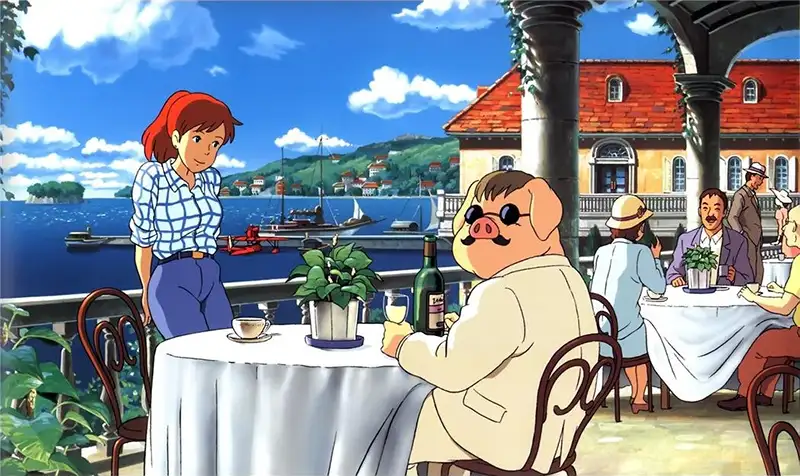With its fascinating premise and beautiful aesthetics, Porco Rosso remains one of the most interesting movies by Hayao Miyazaki 31 years after it was made.
When thinking about Hayao Miyazaki, Porco Rosso cannot help but come to mind as one of his most fascinating films to this day. Whether that is because it’s set in Italy, which I inevitably have a personal connection to, or because it is one of the Miyazaki films I was lucky enough to see in the cinema, Porco Rosso has always been my favourite film by the Japanese filmmaker. As a new Miyazaki movie is about to come out in cinemas later this month, what better time than now to revisit one of his absolute best films?
Porco Rosso begins in 1929 and follows his titular character Porco Rosso (Shūichirō Moriyama) – Crimson Pig in English – a freelance bounty hunter who fights against the air pirates in the Adriatic Sea. Once a World War I fighter called Margo Pagot, Porco is now under a curse that transformed him into an anthropomorphic pig and is on the run from the Italian authorities for leaving the Air Force as he refuses to fly for the fascist government. Despite the arrest warrant against him and multiple warnings by Gina (Tokiko Kato), Porco still decides to have his damaged plane repaired in Milan where he meets Fio (Akemi Okamura), the young granddaughter of his mechanic who will work on repairing Porco’s beloved plane and join him in his adventures.
Set in the Adriatic Sea, Porco Rosso takes place in a very real and recognisable geographical setting and historical context, which may initially seem to defy Miyazaki’s trend of films set in a fantastic and magical land. But it is a Miyazaki film nonetheless, touching on key themes dear to the director such as the clear anti-war message and brave and strong female co-protagonist. Much like many of the director’s beloved works, including the upcoming The Boy and the Heron, Miyazaki can combine the fantastical element with a very real historical component.
The historical setting of Porco Rosso is key to its story, perhaps even more so than in his other films, which may be one of the reasons why it always stood out to me so much. Admittedly, the film does have its fantastical elements, with Porco’s curse condemning him to look like a pig rather than a man. Ultimately, the political and historical realism of the film is what makes it such an unforgettable product, thanks to the many references to the historical context of Fascist Italy and homages to the time of early aviation. With small details, like the Fascist propaganda posters in Milan, the threat of Fascism is always present and imminent in Porco’s life.

In the age-old debate – most recently resuscitated by the upcoming Ferrari by Michael Mann – on making films about cultures that are foreign to the filmmaking team, Porco Rosso perfectly illustrates where the line between appreciation and appropriation lies. Despite not being Italian, Miyazaki portrays a story that is deeply rooted in Italy both in its historical context and geographical setting but, contrary to other more recent examples, it does so with respect and care for a cultural background that is not his own. The research the director did is evident in every frame of the film from the reference to the Fascist government the main character is so deeply against to the Italian grandmothers who will not eat their pasta without having prayed first.
Porco Rosso also excels at building its character. When we first meet him, Porco is anything but a hero: while his status as a pilot is immediately established as legendary, the character himself is very quickly set up as a somewhat unsympathetic protagonist. But as the film goes on and we find out more about him, we cannot help but love Porco and inevitably root for him when it comes down to the race he has to face. While he may seem uncaring and cold at first, Porco has a big heart and is ready to sacrifice himself for the people he loves.
“I’d rather be a pig than a fascist,” says the main character in Porco Rosso in one of the most iconic lines of the film. In 1992, the movie spoke to the context of the time, in the wake of the siege of Dubrovnik and during the conflict in Yugoslavia that broke out during the film’s production. In 2023, Porco Rosso’s message of resisting a far-right political movement is still incredibly relevant. In uncertain times – both the one we are living in today and the Fascist era the film is set in – Porco and his unyielding moral code is still an example that we can still learn from and look up to.
The film also has very clear feminist undertones through Fio and Gina who are both fierce characters taking control of their destiny and future in an age where it was not so common for women to do so. In many ways, they also take on roles that would be traditionally associated with men, such as flying planes or building a plane for Fio and running a hotel for Gina, while still maintaining their feminine side, which is something many films today still struggle to do and is still so necessary to see in the depiction of female heroines. Needless to say, they are both incredibly well-structured characters, much like Porco.
Porco Rosso is Miyazaki at his best, mixing visually pleasing shots of the Adriatic Sea locations with a story about an unlikely hero, a pig-looking bounty hunter who has run away from Fascist Italy and claims to only fly for himself. With its feminist discourse and anti-fascist spirit, this film will never get old or feel outdated no matter how many times we may revisit it after it was first made, now more than 30 years ago.
Porco Rosso is now available to watch on digital and on demand.

